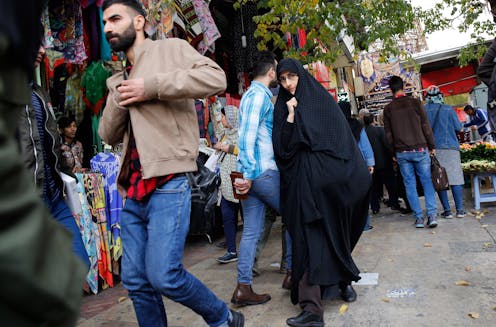US-Iran conflict escalates again, raising the threat of another war in the Middle East
- Written by Tony Walker, Adjunct Professor, School of Communications, La Trobe University

Let’s start with a number. On any given day, more than 17 million barrels of oil pass through what is known as the world’s most important chokepoint.
Those 17 million-plus barrels constitute about 20%, give or take a few percentage points, of world oil consumption daily.
The waterway in question is the Strait of Hormuz at the entrance to the Arabian Gulf to the north. It is 33km wide at its narrowest – where its “chokepoint” shipping lane measures just 3km across.
This is barely enough space for supertankers to pass.
Any interruption to seaborne oil-trade through the strait in the world’s most volatile region would immediately push up oil prices, add to risks of a global recession and prompt concerns about a wider conflagration in the Middle East.
Read more: Trouble in the Gulf as US-Iran dispute threatens to escalate into serious conflict
The Strait of Hormuz is not simply a chokepoint. It would become a flashpoint in the event of military confrontation between the US and Iran.
It is hard to overstate the dangers of unintended consequences from an escalation of American military pressure on Iran that risks bringing the region to the brink of war and severing an economic lifeline to the rest of world.
This scenario hardly bears thinking about. Yet Donald Trump has seemed determined to push Iran to the brink by re-instituting punitive economic sanctions that are causing real hardship to Iranians.
What is at stake for the regime in Tehran is its survival. It will not yield to crude American pressures which reflect a certain mindset in Washington that appears to believe that regime change on the cheap is achievable.
At the heart of an escalating dispute between the US and Iran is the US withdrawal from the 2015 Joint Comprehensive Plan of Action nuclear deal and re-imposition of sanctions, notwithstanding that Iran was complying with its obligations. Iran is now threatening to resume production of low-enriched uranium beyond amounts specified in the deal.
This agreement was negotiated over many months by the permanent members of the United Nations Security Council plus Germany to forestall Iran’s nuclear ambitions. Washington’s abrogation of it ranks as the most irresponsible act – among many – of the Trump administration.
America’s stringent sanctions that penalise entities that do business with Iran, allied with risks of conflict in the Gulf, are exerting enormous stress on the Western alliance.
American leadership in this case is perceived to be part of the problem, not part of the solution.
Vali Nasr, an Iranian specialist at the International Crisis Group, warns of a mistake or a miscalculation. He told The New York Times:
President Trump may not want war, but he will get one unless he balances coercion with diplomacy.
At this point, there is not much sign that American diplomacy provides a real prospect of an easing of tensions.
This week, the US announced it was deploying another 1,000 troops to the region to join more than 6,000 already in place. It has sent an aircraft carrier battle group to the Gulf, and has positioned B-52 bombers on bases in proximity to Iran.
All this is feeding high levels of anxiety in the Gulf region and across the Middle East. Further afield, markets across Europe, Asia and North America are nervously watching developments.
Whatever Washington’s strategy of exerting maximum pressure on Iran is, it is not working. It is also not clear whether there is a plan B.
Read more: Why Trump's decertification of the Iran nuclear deal may prove a costly mistake
America’s avowed aim is to bring Iran back to the negotiating table to force concessions on the nuclear deal. The US also wants the Iranians to scale back what Washington perceives to be their destabilising behaviour in the region.
This includes allegations Iran is behind a series of attacks in the Gulf on shipping tankers and oil pipelines in recent weeks. Iran denies involvement.
Circumstantial evidence of Iranian involvement is fairly compelling. But such is the damage done to Western intelligence credibility by mistakes in the lead-up to the Gulf War in 2003 that anything Washington says based on its own intelligence is questioned.
Let’s put forward another figure. The 17 million barrels passing through the Strait of Hormuz daily represent 30% of the world’s seaborne-traded oil.
Those shipments account for the bulk of oil shipped by the world’s major oil producers and OPEC members – Iran, Iraq, Saudi Arabia, Kuwait and the United Arab Emirates.
There’s another figure that is relevant. About 25% of the world’s traded liquefied natural gas (LNG) also transits what is arguably the world’s most strategically important waterway. Qatar, which matches Australia as the world’s largest exporter of LNG, sends almost all of its LNG through the strait.
In other words, this is a crowded energy superhighway by any standards.
The strait connects the Arabian Gulf with the Gulf of Oman to the south and the Arabian Sea beyond.
It is bounded on the eastern perimeter by Iran and to the west by the oil-rich Gulf states led by Saudi Arabia.
The Saudis have been urging their American allies to take “surgical” reprisals against Iran for attacks on shipping in the Gulf. In such a case, Iran would not turn the other cheek.
Tehran is certain to have a roster of retaliatory options starting, no doubt, with a further disruption to shipping in the Gulf. American naval forces could be deployed to keep Gulf sea lanes open, but this would come at a cost.
The most immediate cost would be felt in the world’s energy markets. What could not be discounted is another war in the Middle East and the destabilisation of the entire region.
These are dangerous moments.
Authors: Tony Walker, Adjunct Professor, School of Communications, La Trobe University





